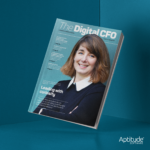Previously published in The Digital CFO Magazine
As the recently named CFO of the British Standards Institution (BSI) and the former SVP of Finance at Expedia, Sara Dickinson has deep finance experience across SaaS, travel, and technology businesses. She recently spoke with Christophe Kasolowsky about her vision of a Digital CFO, how automation is reshaping what a great finance professional looks like, and why she now thinks we are closer to the futuristic view of a CFO (think AI-powered glasses with real-time dashboards) than she expected.
Christophe: Thank you so much for joining me today, Sara. Let’s start with the phrase on which this magazine is based – The Digital CFO. What does that phrase mean to you?
Sara: Great question to start with – tough one to start with! A Digital CFO thinks with a sort of technology-first mindset, because what digital does is enable all of the great data and insights – which have become the purview of the finance function over the last decade – and accelerates access to data and the ability to drive insight from it. A Digital CFO really prompts that curiosity and insight-driving engine across the whole organization.
We (finance) are now the people who champion digital transformation for the whole organization because we are the people who have the unique ability to see end to end in a business. We see the start of a transaction or a sale or an interaction and we see right down to its very end conclusion all the way to closing the year end and reporting it. We therefore have that ability to identify, across the whole organization, where digital capabilities can transform for the better.
Christophe: How does this new focus on digital finance impact the skills and set-up of the finance function? Will the fact that now there’s all this time to be a business leader mean that you have to be a different person with a different background?
Sara: Absolutely it will. It will change and reshape and redefine what a great finance professional looks like. But I wouldn’t want all my skilled and dedicated colleagues out there to interpret this as me saying, this is the end of our world. What it actually will mean is there’s still a great need for our skills. We will use them in a much more focused way to help guide our business around future decisions. It’s really just refocusing our energies and also thinking about how we can interact with our stakeholders in a different way.
As an example, most companies now accept that the new product solutioning cycle has rapidly sped up and that they must work globally. So, there is a huge need for really skilled finance professionals to be able to advise on what is the right pricing mechanism, what are the optimal pricing mechanisms, what is the tax compliant way of actually selling these products in multiple geographies on a worldwide basis? That’s where we bring real value and that’s where we need to put our energies. But that also means we’ve got to learn a new language in how we interact with our stakeholders. We can’t just hand a compliance textbook to people and walk away!
Christophe: Do you see a huge data science component coming into play for future finance leaders?
Sara: Definitely. But I would suggest the skills finance leaders are now looking for are not an ability to code, or to run the machine learning, but the ability to be able to ask the right questions and direct the data teams within your organization to build effective solutions. Key skills need to include curiosity, a global trade mindset, and the ability to adapt to compliance needs on a global basis. And then we do hear about this ability to be a good storyteller. I always have a little tweak of nervousness when we talk about storytelling and finance because there’s a little bit of a ‘we want the truth,’ element in finance.
However, I think it’s the ability to articulate so that other people really understand the challenge you’re trying to solve for. And knowing enough about AI and machine learning and data and digital environments to be able to work with the technologists in a really productive way.
Christophe: Where do you think we are on the technology journey, especially in what I call the poor cousin of any organization – the finance function. How close are we to seeing these new technologies make a massive difference in finance?
Sara: I think if you had asked me two or three years ago, I’d have said we’re still at early stages. But we have seen so much change in the last two years because everybody has had that forcing factor of having to think about it. I’ll also take a step back and say digital finance is not just about technology readiness. When we’re talking about what it means to be digital it doesn’t mean putting a wrapper of systems around your existing culture, ways of working, and processes that you have. Being digital means actually taking that step back and saying, how can I use new technologies to really transform everything I do? Solutions, like Fynapse, which are fully integrated, cloud-based, and can interface with other technologies – the solutions are there. They’re not a dream. They are actually there to be used. I think we are much further along than people perhaps see. But it’s as much about freeing our mindset to take that step and really utilize the products that are there.
I remember reading an article about three or four years ago and it said, imagine the world of the CFO where they wake up in the morning and they put on their VR headsets where
they get their readout of their client list and their current sales, and it’s interfaced with macroeconomic risk data and predictive trading recommendations. And I’m thinking, oh gosh, that sounds great. I think we’re actually a lot closer to that now than I thought we would ever get.
Christophe: What is your perspective around how CFOs can shape a transformation case that the internal stakeholders are not just inspired by but also happy to put some money behind?
Sara: Thank you for asking this. I have a sense of empathy because it is, I think, the biggest challenge for CFOs. At the core of what we do there is a finance reporting requirement whether that be daily, weekly, monthly, quarterly, annually. It has to be right, has deadlines, has to be complete, you know, so when you think about transforming finance, the challenge is usually getting people comfortable with the risk of change. I think when we talk about persuading people and building the business case we need to give them the comfort that we can manage that risk factor. But that is where the new solutions that we talked about come in because they are cloud based and can be bolted in. It’s not the world that it used to be where making any change had to be all encompassing. That always used to worry people and there was never a good time because there’s always a next month close and a quarter close that couldn’t be impacted. Now we’ve moved away from that and to solutions which themselves can be integrated in much shorter time frames, in a modular way, so you can test on one part of your business and then roll out across the rest. Everybody is looking to their finance functions and saying, how do I get better? How do I improve my unit economics? How do I get the insights which mean I hone down and use every single pound or dollar to really deliver value? Your compelling business case as the CFO is that this transformation is how I help you drive that insight. This is how I get even better and even faster at finding those solutions to improve the unit economics. This is how I guide you to find the gaps in your service delivery. That’s how you shape it.
Christophe: What are one or two learnings you’ve picked up over the course of your career that have influenced your vision of what a Digital CFO should be?
Sara: First I would say just be really curious. The privileged role of finance is to be able to ask questions. So really hone your ability to ask great questions. I think that was something I learned really early on as the business partner to an innovation team sitting right at the driving edge of the strategic intent of an organization. If you are a young finance professional, try to get that type of experience, really see how organizations can use innovation to achieve strategic goals. I think the other great learning for me was to truly see myself as a business partner. Approach the role as if you are a partner in your own business and ask what you would want to see done. I think very early on I learned the role of finance is to help provide information and insight, to constructively challenge. But it is also then to help find the solutions. It is a true partnership dedicated to finding the best long-term solution for the organization.
Christophe: And I suppose a related question but how do you go about nurturing talent?
Sara: The easy, quick answer to that is to find what energizes people and empower them to lean into that. Often it is not that straight forward though, since many of us need to experience things to find what really ignites our talent and passion so it is key to offer varied opportunities to people. What is critical for me is that people demonstrate boundless curiosity and a positive, forwardthinking mindset. If they have that then I believe pretty much everything else can be developed. You can then coach for the critical skills of effectively influencing and interpreting different business models. Lastly, build a team that trusts and values each other. A team that supports each other effectively in my experience is always bigger than the sum of its parts.
Christophe: Thank you for sharing your insights and expertise, Sara!



